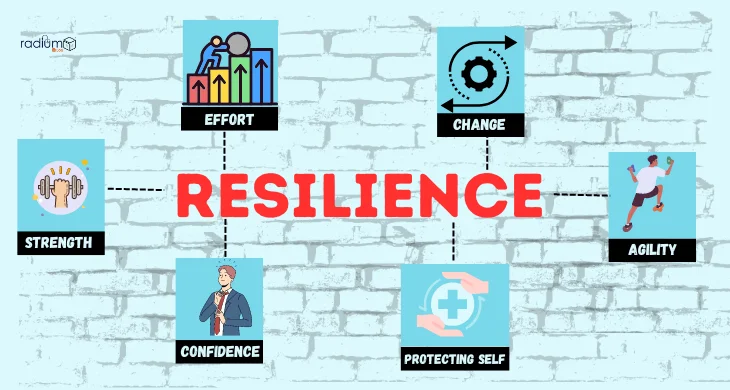Life is a path marked by moments of joy and challenges. While we can’t always control the obstacles that come our way, we have the power to build resilience that helps us navigate through challenges with strength and grace. In this blog, we’ll explore the concept of resilience, understand its importance, and learn practical strategies to cultivate resilience in the face of adversity.
What is Resilience?
Resilience is the ability to bounce back, adapt, and recover from challenges, setbacks, and adversities. It is a dynamic quality that empowers individuals to face difficult situations, stressors, and changes in a healthy and effective way. Resilience involves maintaining a positive attitude, emotional stability, and mental strength even when confronted with adversity.
Resilient individuals are not immune to difficulties, but they possess the skills and mindset to navigate challenges and emerge stronger on the other side. They can effectively manage stress, maintain their overall well-being, and continue to pursue their goals despite obstacles.
Key components of resilience include:
- Positive Outlook: Resilient individuals tend to focus on the potential for growth and learning that can arise from challenges. They maintain a positive attitude and believe in their ability to overcome difficulties.
- Problem-Solving Skills: Resilient people are skilled at identifying potential solutions and taking proactive steps to address challenges. They are resourceful and creative in finding ways to navigate difficulties.
- Emotion Management: Resilient individuals can skillfully regulate their emotions. They can experience and express emotions in a healthy way without being overwhelmed by them.
- Social backing: Constructing and sustaining a robust network of support plays a pivotal role in fostering resilience.Having friends, family, or a community to lean on provides emotional validation, encouragement, and a sense of belonging.
- Self-Care: Resilient individuals prioritize self-care and recognize the importance of maintaining their physical, emotional, and mental well-being.
- Mindfulness: Practicing mindfulness and staying present in the moment can enhance resilience. Mindfulness helps individuals manage stress, reduce anxiety, and cultivate a sense of calm.
The Importance of Resilience
Life is full of unexpected twists and turns, and the ability to navigate these challenges with resilience is an essential skill. Resilience allows us to face adversity, setbacks, and stressors with strength, adaptability, and a positive outlook. It’s not about avoiding difficult situations but about bouncing back from them and emerging even stronger.
Resilience plays a crucial role in various aspects of our lives:
- Mental and Emotional Well-being: Resilience helps us manage stress, anxiety, and depression. It allows us to process negative emotions in a healthy way and maintain a balanced mental state.
- Coping with Change: Life is dynamic, and change is inevitable. Resilience enables us to adapt to new circumstances, whether they’re positive or challenging, without feeling overwhelmed.
- Improved Decision-Making: When we’re resilient, we can think clearly even in the face of difficulties. This helps us make well-informed decisions instead of reacting impulsively.
- Relationships: Resilience enhances our ability to communicate effectively, empathize with others, and offer support during their tough times. It strengthens our connections and fosters a sense of community.
- Professional Success: In the workplace, resilience helps us tackle demanding tasks, manage workloads, and handle setbacks. It also encourages leadership qualities and problem-solving skills.
Strategies for Cultivating Resilience
Resilience is a valuable trait that empowers us to navigate life’s challenges with grace and strength. While some individuals seem naturally resilient, it’s a skill that can be nurtured and developed over time. Here are several approaches to foster resilience in your life:
- Develop a Positive Mindset: Cultivate optimism and focus on the positive aspects of situations. Train your mind to see opportunities for growth even in the face of difficulties.
- Practice Self-Care: Prioritize your physical, emotional, and mental well-being. Participate in activities that bring you happiness, relaxation, and renewal. Regular exercise, proper nutrition, and adequate sleep contribute to resilience.
- Build Strong Relationships: Surround yourself with supportive and positive people who uplift you during tough times. Strengthen your connections with friends, family, and your community.
- Practice Mindfulness: Mindfulness helps you stay present, acknowledge your emotions, and manage stress. Practices such as deep breathing, meditation, and yoga can assist in maintaining a sense of grounding.
- Establish Attainable Objectives: Divide overarching goals into manageable, accomplishable tasks.Celebrate your successes along the way, no matter how small they may seem.
- Adaptability: Embrace change and view challenges as opportunities to learn and grow. Being adaptable allows you to adjust to new circumstances and overcome obstacles.
Real-Life Examples of Resilience
Resilience is a powerful quality that individuals exhibit when facing challenges and adversity. Here are a few real-life examples of people who have shown remarkable resilience:
- Malala Yousafzai: Malala, a Pakistani education activist, survived an assassination attempt by the Taliban when she was just 15 years old. Despite the attack, she continued to advocate for girls’ education and women’s rights. Malala’s determination and courage have inspired millions around the world.
- Nelson Mandela: For his anti-apartheid activism in South Africa, Nelson Mandela endured a 27-year imprisonment. After his release, he worked to end apartheid and became the country’s first black president. Mandela’s ability to forgive and lead with grace after his long imprisonment exemplifies resilience.
- J.K. Rowling: Before achieving success with the “Harry Potter” series, J.K. Rowling faced multiple rejections from publishers and struggled as a single mother on welfare. Her persistence and belief in her story led her to become one of the world’s most successful authors.
- Stephen Hawking: Renowned physicist Stephen Hawking battled amyotrophic lateral sclerosis (ALS) for most of his life, which progressively left him paralyzed. Even with physical constraints, he achieved pioneering advancements in theoretical physics and served as an ongoing inspiration to others.
FAQS:
Q1. What does resilience mean, and why does it hold significance?
Ans: Resilience refers to the ability to bounce back from challenges and adversity. It’s important because it empowers individuals to navigate life’s ups and downs, maintain well-being, and continue pursuing goals even in difficult circumstances.
Q2. Can resilience be developed or learned?
Ans: Yes, resilience can be developed and learned. It involves cultivating positive attitudes, coping strategies, and adaptive behaviors that help individuals handle stress and setbacks effectively.
Q3. What are some common factors that contribute to resilience?
Ans: Factors that contribute to resilience include a strong social support system, healthy coping mechanisms, positive self-beliefs, problem-solving skills, and the ability to manage emotions.
Q4. How can I build resilience in my daily life?
Ans: You can build resilience by practicing mindfulness, setting realistic goals, fostering strong relationships, engaging in self-care activities, seeking support when needed, and learning from past challenges.
Q5. How does resilience affect mental and emotional well-being?
Ans: Resilience positively impacts mental and emotional well-being by reducing the impact of stressors, improving emotional regulation, and promoting a sense of control and optimism.
Q6. Can building resilience help improve relationships?
Ans: Yes, building resilience can improve relationships by enhancing communication skills, empathy, and understanding.
Conclusion
Resilience is a valuable skill that empowers us to face life’s challenges with courage and determination. By cultivating resilience, we can transform difficulties into opportunities for growth and personal development. Keep in mind, resilience isn’t inherent; it’s a skill that can be cultivated with time. As we build resilience, we equip ourselves to embrace life’s journey with strength, grace, and unwavering determination.
Stay informed with the latest updates and breaking news, brought to you by radiumnews.




